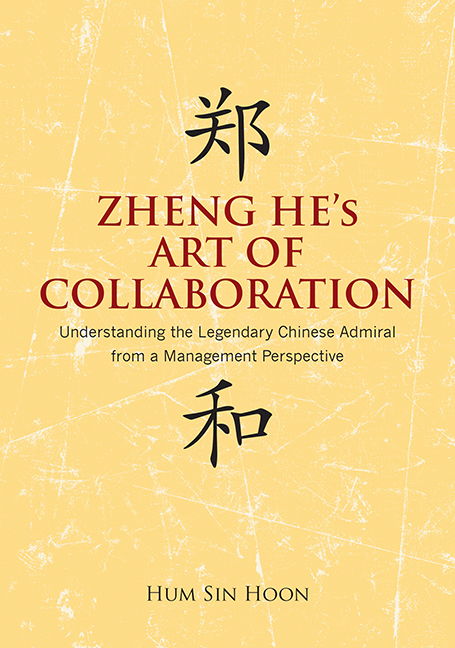 Zheng He's Art of Collaboration
Zheng He's Art of Collaboration Leadership Principles and Practices
from PART II - ZHENG HE AND HIS MANAGEMENT
Published online by Cambridge University Press: 21 October 2015
INTRODUCTION
Most, if not all, of the writings about Zheng He has been from the historical, maritime, diplomatic and cultural perspectives. Accordingly, the written literature has conferred many titles on Zheng He from these perspectives, praising him as a eunuch military commander, an admiral, navigator and explorer, a diplomatic Ming envoy, and a cultural disseminator.
Which of these titles would be most apt in describing Zheng He and his vocation? His claim to fame seems to stem from the fact that he had accomplished the colossal feat of having moved and fed some 27,000 crew, spread out over 200–300 ships of unprecedented sizes, seven times across the long and wide stretches of oceans between China, Southeast and South Asia, Arabia and Africa. And much of these waters were in many places fraught with dangers and infested with pirates; and each of these voyages took place over long durations of 1.5 to 2 years, back in the early fifteenth century, without the help of modernday communications and satellite technologies.
Was Zheng He therefore great because of his outstanding seamanship or navigation capabilities as demonstrated in these epic voyages? Given his background as a military general who was neither trained in maritime warfare nor specialized in navigation, it is difficult to come to such a conclusion.
More recently, in a 2005 video production screened over Channel NewsAsia as part of the celebrations of Zheng He's 600th anniversary of his maiden voyage, Zheng He was portrayed as a modern-day CEO. Also, in his paper presented at the International Conference on Zheng He and the Afro-Asian World held in Malacca in 2010, Captain Rivers described Zheng He as follows: acting as it were as a CEO, he repeatedly directed the extensive preparations that enabled great fleets to follow previously established trade routes where only handfuls of trading vessels had plied before.
Evidently, Zheng He's success in leading his emperor-decreed voyages would suggest that he had much capability in the realm of leadership and management; after all, it is obvious that these grand voyages were representative of careful and strategic planning, organization, coordination and control. In this regard, Zheng He had surely demonstrated much leadership and management capabilities, like a modern-day CEO indeed.
To save this book to your Kindle, first ensure no-reply@cambridge.org is added to your Approved Personal Document E-mail List under your Personal Document Settings on the Manage Your Content and Devices page of your Amazon account. Then enter the ‘name’ part of your Kindle email address below. Find out more about saving to your Kindle.
Note you can select to save to either the @free.kindle.com or @kindle.com variations. ‘@free.kindle.com’ emails are free but can only be saved to your device when it is connected to wi-fi. ‘@kindle.com’ emails can be delivered even when you are not connected to wi-fi, but note that service fees apply.
Find out more about the Kindle Personal Document Service.
To save content items to your account, please confirm that you agree to abide by our usage policies. If this is the first time you use this feature, you will be asked to authorise Cambridge Core to connect with your account. Find out more about saving content to Dropbox.
To save content items to your account, please confirm that you agree to abide by our usage policies. If this is the first time you use this feature, you will be asked to authorise Cambridge Core to connect with your account. Find out more about saving content to Google Drive.